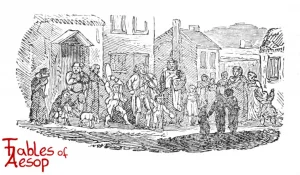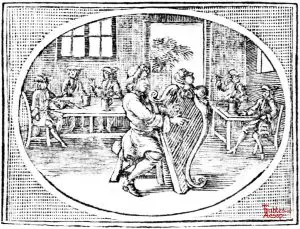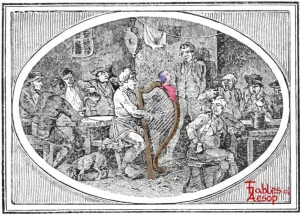A Harper (man playing the harp) thought himself good enough to play on the public stage. The audience’s hisses proved him otherwise. Too much ambition.
Do not strive beyond your abilities.
A Man who used to play upon his Harp, and sing to it, in wine-shops and other small places of entertainment, was led by the applause which his efforts met with there to desire a larger sphere in which to display his talents. He fancied if he could only be once allowed to play and sing upon the stage of the public theatre, renown and fortune must assuredly follow. He tried long and hard, and at last gained the necessary permission, but in such a vast place, his strains seemed so weak, thin, and wretched that he was unanimously hissed off the stage.

Samuel Croxall
A FELLOW that used to play upon his Harp, and sing to it in little alehouses, and made a shift, by the help of those narrow confined walls, to please the dull sots who heard him; from hence entertained an ambition of showing hi$ parts upon the public theatre, where he fancied he could not fail of raising a great reputation and fortune in a very short time. He was accordingly admitted upon trial; but the spaciousness of the place, and the throng of the people, so deadened and weakened both his voice and instrument, that scarce either of them could be heard; and where they could, it sounded so poor, so low, and wretched, in the ear of his refined audience, that he was universally exploded and hissed off the stage.
THE APPLICATION.
When we are commended for our performances by people of much flattery, or little judgment, we should be sure not to value ourselves upon it; for want of which, many a vain unthinking man has at once exposed and lost himself to the world. A buffoon may be very agreeable to a company disposed to be mirthful over a glass of wine, who would not be fit to open his mouth in a senate, or upon a subject where sound sense and a grave and serious behaviour are expected. It is not the diverting a little, insignificant, injudicious audience or society, which can gain us a proper esteem, or insure our success, in a place which calls for a performance of the first rate; we should have either allowed abilities to please the most refined tastes, or judgment enough to know that we want them, and to have a care how we submit ourselves to the trial. And, if we mind to pursue a just and true ambition, it is not sufficient that we study barely to please, hut it is of greatest moment whom we please, and in what respect; otherwise, we may not only lose our labour, but make ourselves ridiculous into the bargain.

Thomas Bewick (The Harper)
A Man who used to play upon the harp, and sing to it, in little ale-houses, and made a shift in those narrow confined walls to please the dull sots who heard him, from hence entertained an ambition of shewing his parts in the public theatre, where he fancied he could not fail of raising a great reputation and fortune in a very short time. He was accordingly admitted upon trial; but the spaciousness of the place, and the throng of the people, so deadened and weakened both his voice and instrument, that scarcely either of them could be heard, and where they could, his performance sounded so poor, so low, and wretched, in the ears of his refined audience, that he was universally hissed off the stage.
APPLICATION.
When we are commended for our performances by people of much flattery or little judgment, we should be sure not to value ourselves upon it; for want of this caution, many a vain unthinking man has at once exposed himself to the censure of the world. A buffoon, though he would not be fit to open his mouth in a senate, or upon a subject where sound sense and a grave and serious behaviour are expected, may be very agreeable to a company disposed to be mirthful over a glass of wine. It is not the diverting a little, insignificant, injudicious audience or society, which can gain us a proper esteem, or insure our success, in a place which calls for a performance of the first rate. We should have either allowed abilities to please the most refined tastes, or judgment enough to know that we want them, and to have a care how we submit ourselves to the trial. And, if we have a mind to pursue a just and true ambition, it is not sufficient that we study barely to please; but it is of the greatest moment whom we please, and in what respect, otherwise we may not only lose our labour, but make ourselves ridiculous into the bargain.


